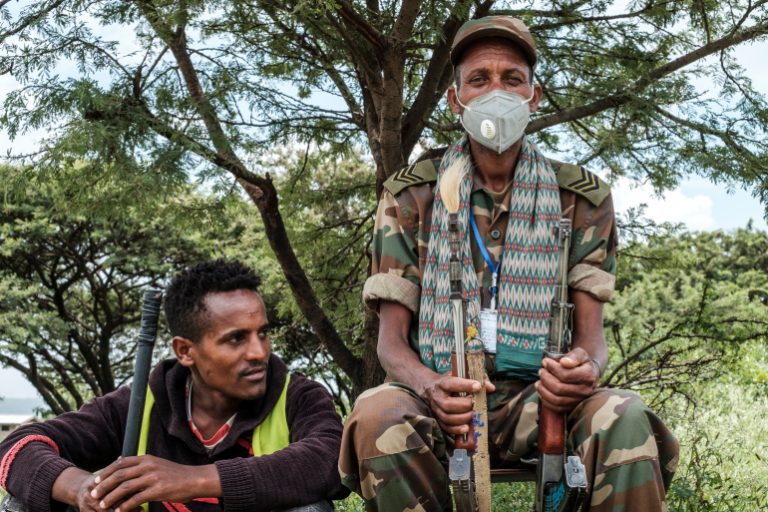
Ethiopia’s Prime Minister Abi Ahmed is locked in a dispute with the political party that dominated the country’s politics for decades, questioning his ability to hold Ethiopia together through a fierce political transition.
On 7 October, legislators known as the House of Federation (HoF) – the upper house of Ethiopia’s parliament – voted to withdraw budgetary subsidies to the Tigray regional state in the north of the country.
Hoi’s move, dominated by Abi’s allies, came two days after Tigre’s regional leaders – and Abi’s political rivals – decided to call back their representatives at the federal level.
Tensions had already been underway since September when the Tigray region contested earlier this year in defiance of a decision by central authorities to postpone all parliamentary and regional elections scheduled for August due to the coronovirus epidemic.
Abi’s detractors said there was a move by the Prime Minister to prolong his rule and move forward with the election, including the Tigre People’s Liberation Front (TPLF) – the major political force of the Ethiopian People’s Revolutionary Democratic Front (EPRDF), a multi-ethnic , A four-party coalition that had run the country for nearly 30 years – won a resounding victory.
The TPLF had already split from the EPRDF in 2019 when it, along with three other coalition parties, refused to merge with the newly formed Samriddhi Party (PP) under Abi.

However, HoF declared null and void on 9 September, indicating that the new Tigri regional assembly would not be recognized by the federal government.
The latest moves are seen as part of a campaign of mutual legalization, raising fears of political turmoil that could spiral into a security crisis, the latest challenge to the federal system that over Ethiopia’s more than 80 ethnic groups Stitches together.
Vandimu Asminue, a former diplomat and currently head of the Tigre Friendship Lions Office, based in the Tigray regional capital Mekele, is to blame the federal government for the current situation in Addis Ababa.
Vondimu said, “From the outset, Abi’s team had a strategy of trying to sideline, make it irrelevant and even criminalize.”
Vandimu was referring to the strained relationship between the Prime Minister and the TPLF back in April 2018, when Abi assumed office after a week-long secret deliberation within the EPRDF.
Taking charge after months of anti-government demonstrations, Abi promised to resolve the country’s deep ethnic and political divisions and change the repressive and violent image of the EPRDF. In the first few months, he accelerated political reforms that began in the days of his predecessor, Halimarim Desalegan. Political prisoners were released and opposition parties were allowed to work, while Abi also won the Nobel Prize for securing peace with neighboring Eritrea.
The reform process saw the long-dominant TPLF as being put to one side, as the EPRDF’s Oromo and Amhara political centers moved to the political center – even in recent months leading Oromo figures said Abi, a Moral Oromo is accused of being poor. Advocacy of moving towards Oromo interests and totalitarianism.

Ethnic Tigrans make up about 6 percent of Ethiopia’s population, while ethnic Amharas and Oromos together comprise about 65 percent of Ethiopia’s total population.
While the relationship between Abi and TPLF was tense from the beginning, the merger of EPRDF into PP led to enmity between the two sides – and the postponement of national elections added to the fire.
“Abi was not prepared to resolve issues within the political and constitutional framework and instead resorted to ejecting our officers and destroying the EPRDF,” said Vondimu.
‘Mutual brittleness and mistrust’
A political analyst based in Addis Ababa, who wished to remain anonymous because of the sensitivity of the case, said the dispute between Tigray and the federal government comes at the worst of times for Ethiopia, which has already led to the proliferation of COIDID-19 Is struggling to slow down. And to deal with a potentially devastating desert locust invasion.
The analyst said, “Both sides are locked in a cold war of war, which could mess up the whole country.” “In such a state of mutual brittleness, mistrust and confusion, it can lead to an armed conflict with the Ethiopia-Eritrean border war just like it did 22 years ago.”
The head of the PP’s office in the Tigray region, Nebiu Sehul-Michael, rejected an armed conflict, but said the TPLF’s destructive political behavior required a proportional answer from Addis Ababa.
“The federal government’s withholding of budget subsidies means ending TPLF’s utter anarchy and seditious actions,” Nebiu said.
“The current pace of relations was quite late due to the open mind and generosity of the federal government. Legal relations with lower bodies and administrations can continue based on the federation, the constitution as well as proclamations and procedures.”
The sector was due to receive federal subsidies totaling approximately $ 280 million for the current fiscal year. It is unclear how much funding will be affected by Hoof’s move. The federal government has previously stated that it will fund through lower-level government bodies in Tigray, bypassing the state legislature and executive, although the question remains how that will work in practice.
Some said that the move to cut the budget subsidy would cause mutual economic suffering.
“Tigre has a large tax base and a relatively strong manufacturing base. In addition, an economic siege by the federal government would be likely, as it would create solidarity between the people and the government in the face of a perceived threat by the central government, ”the analyst said.
Already, Tigre region officials have publicly indicated they will hold back